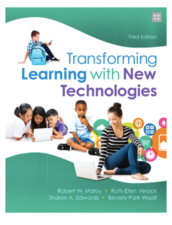Integrating Educational Technology in the Classroom
McGill course code: EDPT 200
Fall 2019, Mondays 6:05 to 8:55 pm
Educaton Bldg. ~ Room B129
Instructor: Sam Bruzzese (email: sam.bruzzese@mcgill.ca & Twitter: @sam_bruzzese)
Course Web Site: http://edpt200.mcgill.ca
Mighty Network Site: http://edpt200f19.mn.co
Course Hashtag: #edpt200
Course Mindmap: EDPT 200 Structured Overview
Course Wiki: Transforming Learning Textbook Website
Course Description:
The course is designed to help practicing and future teachers integrate technology in their daily teaching practices. It is a practical, hands-on course that is grounded in constructivist learning theory. The participants will learn by engaging in authentic tasks in a project-based learning environment.
“Technology cannot teach students. Rather, learners teach technologies. Meaningful learning will result when technologies engage learners in the following:
- Knowledge construction, not reproduction
- Conversation, not reception
- Articulation, not repetition
- Collaboration, not competition
- Reflection, not prescription"
Students who complete the course will meet the requirements of the International Society for Technology in Education (ISTE) Educational Technology Standards for Teachers (2017).Here's the Student Standards (2016) from ISTE.
Typical weekly schedule:
6:05-6:25: Observations from previous class; introduction of weekly theme & hands-on activities
6:25-6:50: Group discussion and reflections on readings
6:50-7:50: Main topic for week
7:50-8:40: Hands-on activities and lab
8:40-8:55: Wrap up
Prerequisites:
There are no prerequisites for this course. However, the main focus of the course will be to make sure you learn how to integrate technology in the classroom.
Course Objectives:
- To instill a desire to learn to use technology in the classroom.
- To understand how computers can and are being used in classrooms today.
- To understand and use Web 2.0 technologies and multi-media authoring tools.
- To develop skills in integrating computers in different curriculum areas.
- To gain an understanding of the Quebec Education Plan (elementary and high school).
- The focus for from 2019 onwards will be on the NEW Digital Action Plan for Education and Higher Education.
Course Text (Required):

Transforming Learning With New Technologies (3rd edition) by Maloy, Verock, Edwards and Woolf (Pearson) is the required text for the course.
I do not recommend purchasing the book, since a new edition is coming out next spring. This semester we are using Perusall annotation software.There is a direct link through myCourses.The cost for 6 month access is approximately $38 (US funds).
Articles & other readings will be posted on myCourses.
This course directly targets the development and mastery of the following professional teacher competencies (Quebec Education Department):
- #1:to act as a professional inheritor, critic and interpreter of knowledge or culture when teaching students (i.e. student teachers are able to evaluate the role of media in today’s society both positive and negative).
- # 8: to integrate information and communications technologies (ICT) in the preparation and delivery of teaching/learning activities and for the instructional management and professional development purposes.
- #10: to cooperate with members of the teaching team in carrying out tasks involving the development and evaluation of the competencies targeted in the programs of study, taking into account the students concerned.
- #11: to engage in professional development individually and with others ((i.e. student teachers will use Web 2.0 technologies to participate in professional learning communities).
The students who successfully complete the course will also be able to:
- “demonstrate critical judgement regarding the real benefits and limitations of ICT as teaching and learning resources;
- demonstrate a general understanding of the possibilities offered by ICT (and the internet in particular) for teaching and learning, and know how to integrate ICT in a functional manner into teaching/learning activities, when appropriate;
- use ICT effectively in different aspects of his or her intellectual and professional life: communication, research, information processing, evaluation, interaction with colleagues or experts, etc;
- effectively transmit the ability to use ICT to his or her students in order to support the collective construction of learning in a well-structured, critical manner”
.jpg)